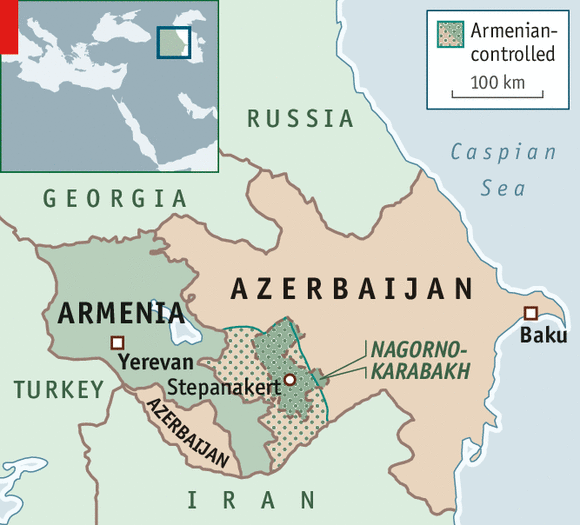|
By Aleyna Baki ’21 and Alice Liu ’23 (Image Credit: The Economist) Dead civilians in flag-draped body bags, young boy-conscripts with rifles, churches turned into shelters, streets carpeted with glass, cars opened like tin cans — this is the current state of Nagorno-Karabakh’s 30 years of conflict. Most recently, on Sept. 27 at 9 a.m., the conflict began around Nagorno-Karabakh, a region that is internationally recognized as a part of Azerbaijan, with a population that is ethnically Armenian. Instantly, the Ministry of Defense of Azerbaijan released a press statement saying Armenia shelled Azerbaijan’s army positions and subsequently announced a “counter-offensive” operation. The Defense Ministry of Armenia accused Azerbaijan of planning “the military actions long in advance.” On Oct. 10, both countries agreed to a Russia-brokered cease-fire to collect the dead and to exchange prisoners, but, just minutes later, bullets were fired again (again, both sides accused each other of starting the fire). Facts are rarely gray, but in the case of Nagorno-Karabakh, it is not only civilians and soldiers who are killed, but the truth, information, and any willingness to resolve the issue.
The roots of the conflict go back to Josef Stalin (Soviet politician who ruled the Soviet Union from the mid-1920s until his death in 1953). In the 1920s, he made Nagorno-Karabakh a part of the Azerbaijani Soviet Socialist Republic (SSR) and gave it autonomous status as the Nagorno-Karabakh Autonomous Oblast (NKAO). When the Soviet Union started to fall apart in 1988, the conflict started between the two nations. After the NKAO demanded to be transferred into Armenia, the forced migration and ethnic cleansing started, which eventually turned into a full-scale war. In 1992, the Organization for Security and Co-operation in Europe (OSCE) formed the Minsk Group (co-chaired by Russia, France and the U.S.) to resolve the conflict. At the end of the war in 1994, 1 million people were displaced and 30,000 people were dead and the cease-fire, under the Bishkek Protocol, left Nagorno-Karabakh and 9% of Azerbaijan to ethnic Armenians. The Republic of Artsakh was proclaimed, but today, not a single nation, not even Armenia recognizes it. Moreover, Armenia has not yet implemented five U.N. Security Council resolutions (Resolutions 822, 853, 874, 884 and one General Assembly resolution 62/243) and the Parliamentary Assembly of the Council of Europe (PACE) Resolution 1416 on the withdrawal of its armed forces from Nagorno-Karabakh and the surrounding districts because “secession and independence” can only be achieved through “lawful and peaceful means,” not through “armed conflict leading to ethnic expulsion and the de facto annexation.” It is concerning that regional powers like Russia and Turkey are getting involved, while so many countries are ignoring the conflict. There is a possibility that this can turn into another proxy war, like the ones in Syria and Libya. Fortunately, Russia has called for the ending of the conflict. Both Azerbaijan and Armenia have very good relations with Russia (Russia sells weapons to both and has military bases in Armenia), so perhaps, they might listen to their ally. Turkey vowed to support Azerbaijan “with all means.” It is reported that Turkey sent drones, F-16s and Syrian soldiers to Azerbaijan, a claim Turkey and Azerbaijan deny. The conflict in Nagorno-Karabakh exposes the worldwide trend toward “tribalism.” The racist, dehumanizing, and jingoistic rhetoric employed by Turks, Azeris and the Armenians in social media effectively display this. The expression of sorrow and the reaction against cruelty comes in all shapes, but demagogues like one particular form of it: they love rallying “us” against “them,” and putting all the guilt on “them.” Demagogues want us to believe in this illusion that we cannot be sorry for and stand in solidarity with victims in both Armenia and Azerbaijan — or other parts of the world — equally and simultaneously. They want us to pick one pain or one place over another. That is why they champion tribalism. To shrink our hearts to such an extent that we become numb to the suffering of “others” and are unable to see the conflicts in its true nature: crimes against humanity. Both countries have to clarify something. What do they want? Soil or ensuring the rights of their citizens? Since the conflict started in September, 41 Azerbaijani and 31 Armenian civilians have died, and hundreds have been wounded on both sides. There should more than calls for a cease-fire: there should be an actual willingness to stop this attack against human rights once and for all. Comments are closed.
|
Photos from Verde River, Manu_H, focusonmore.com, Brett Spangler, Cloud Income

